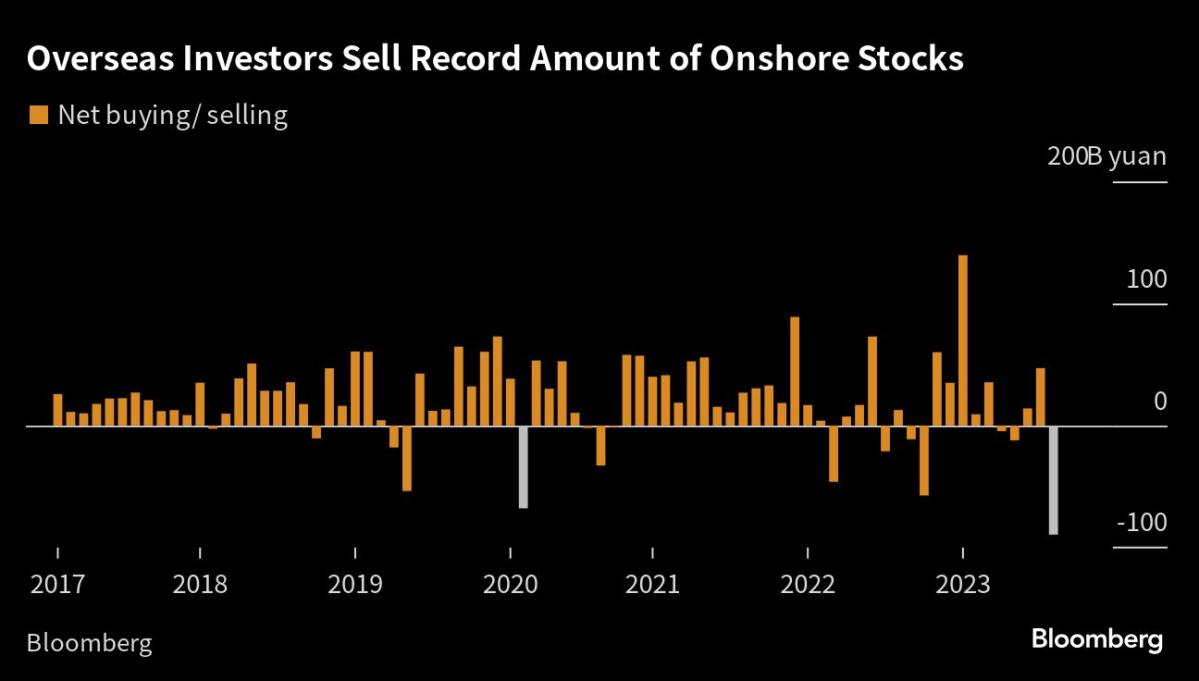Asian stocks, particularly Chinese markets, may find some relief after Wall Street's resilience in the face of rising bond yields, though economic data from China remains underwhelming and foreign investors continue to sell Chinese stocks.
Stock markets worldwide experience declines amid concerns over the Chinese property market, rising US bond yields, and poor economic data in China and the UK.
Volatility and rising interest rates have caused a pullback in U.S. equity markets, particularly impacting the technology sector, but investors should not panic as pullbacks are normal in a bull market and present buying opportunities. China's deteriorating economic conditions and weak seasonal trends have also contributed to the selling pressure. However, support is expected to be found in the 4,200 to 4,300 range in the S&P 500, and the Federal Reserve's likely end to the rate-hiking cycle and improved earnings should provide fundamental support for investors to buy the dip.
US stocks recover from early losses but end the week with sharp drops as the August slump continues, while investors consider the possibility of higher interest rates and concerns over China's economic troubles.
China's stock market is on the verge of a meltdown as major property developers collapse, while Wall Street is booming due to renewed interest in tech stocks, posing a potential threat to the UK as it gets caught in the crossfire.
The markets are facing numerous headwinds, including an imbalanced U.S. economy, stubborn inflation, a looming recession in Europe and China, a bulging deficit, reduced market liquidity, rising geopolitical risk, and high price earnings ratios, making above-average cash reserves a sensible choice for investors.
US companies are becoming increasingly hesitant to invest in China due to concerns over new anti-spying laws, competition from state-funded firms, and the country's economic challenges such as deflation and a property crisis.
Despite a decline in August, the US market is still in good shape, with a correction in stocks being viewed as a normal breather rather than the start of a bear market, while various trends and indicators suggest a continuation of the bullish trend.
China's stock market rebound may be temporary as corporate earnings continue to decline and companies revise down their outlooks, causing concern for foreign funds and prompting Bank of America to urge caution.
Investors are avoiding global stocks with significant exposure to the Chinese market due to concerns over China's property slump and its impact on the economy, causing the MSCI World Index to recover to just 2% below its July-end figure.
US stocks are experiencing their worst performance in September since 1928, but there are signs that the market could avoid a steep downturn this year, with indicators suggesting more stability and positive gains for the rest of the year, according to Mark Hackett, chief of research at US investment firm Nationwide. However, challenges such as elevated oil prices and inflation could put strain on the stock market and the US economy.
India's record stock market valuation and increasing foreign inflows are positioning the country as a safe and attractive investment option, especially amidst the economic troubles and struggling financial markets of its neighboring rival, China.
U.S. equity markets experienced a downturn this week due to concerns about inflation, Federal Reserve statements, and trade tensions, with real estate equities and other yield-sensitive sectors particularly affected by rising interest rates, although hotel REITs rebounded due to improved forecasts for major hurricanes.
China's property shares are declining and tech shares are underperforming, leading to a slide in the Asian market, while the European market waits for monetary policy decisions from the ECB and the Bank of England.
Summary: High valuations in the US stock market suggest lower future returns, making diversification into other markets such as Japan, India, and Brazil a viable option for investors looking for above-average returns in the next decade.
China's macroeconomic challenges, including deflationary pressures, yuan depreciation, and a struggling property sector, could have broader implications beyond its borders, impacting global metal exporters, trade deals, and global inflation; however, investing in China's stocks may offer compelling valuations despite the current downturn.
Risk appetite remains high in the market as Asian markets follow the rally in Wall Street; China's policy support measures, strong business activity data, and positive IPO of Arm contribute to the optimistic market sentiment.
A retreat of funds from Chinese stocks and bonds is diminishing China's global market influence and accelerating its decoupling from the rest of the world, due to economic concerns, tensions with the West, and a property market crisis.
Summary: U.S. stocks slumped amid mixed sentiment about the economy, with only the Dow Jones Industrial Average rising for the week, while Asia-Pacific markets mostly fell, and China's venture capital investment dropped by 31.4% compared to 2022 due to its sluggish economy and geopolitical tensions discouraging foreign investors.
The outlook of U.S. companies on China's markets in the next five years has hit a record low due to factors such as political tensions, tariffs, slow Covid recovery, and issues in the real estate market; however, complete decoupling between the two economies is unlikely.
UBS Investment Bank suggests that the stock slump in China is almost over and investors should be more optimistic about the market outlook, as economic fundamentals have improved and technical signals indicate a potential market rebound.
